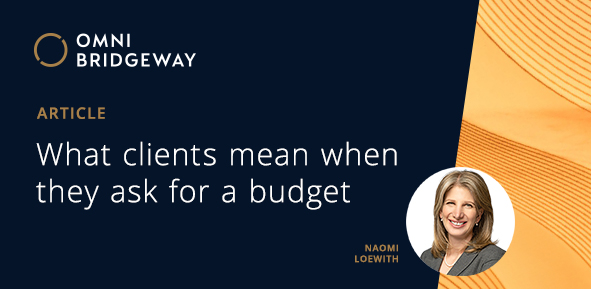What clients mean when they ask for a budget

- Author:
- Naomi Loewith
- Director of Strategic Partnerships - Canada, Investment Manager and Legal Counsel - Canada
As a litigation funder, we routinely work with clients and counsel to understand the likely costs of pursuing a claim. We fund a range of clients across jurisdictions, and work with a diversity of counsel, so we have a unique viewpoint into how lawyers respond when a client asks for a litigation budget. This experience has taught us five things that we recommend all counsel keep in mind when responding to that request.
- Taxes and disbursements. When a client asks, “how much will this cost?”, they are asking, “how much will I spend?” Taxes and out-of-pocket disbursements are part of this spend. If counsel sends a budget without these, they are not answering the client’s question—they are responding with “this is how much I will make”. An accurate and client-centred budget will include all the costs required to advance a claim.
- Time is money. A key factor in the cost of litigation is knowing when the expenses will be incurred. Clients need to manage their cash flow, weigh competing uses of capital, and consider the time value of money. A budget should break down the anticipated expenses by quarter, so clients can accurately do their analysis.
- What are the unknowns? Litigation is inherently uncertain, and virtually every budget we see refers to unknown developments that might render the budget inaccurate. Rather than simply refer to “unexpected steps”, spell out what those might be. Is a motion to add new parties likely? Does this jurisdiction have a low threshold for summary judgment? Not every development can be anticipated, but explaining what the unknowns might be helps the client understand what could lie ahead, and the added cost if they do arise.
- How can I keep it lower? Certain work must be done by the litigation team. However, other steps can be handed off to the client’s in-house group, less expensive contractors, or a first cut done by AI. If there are areas in the case where a client can reduce the cost with their own time or expertise, identify that in the budget.
- You are the expert: Own it. It is hard for a client to hear counsel say both “we are experts in this type of dispute” and “we can’t possibly anticipate what the cost range will be.” Counsel should rely on their expertise and their experience with the court, arbitrator, opposing counsel and subject matter to make a budget as detailed and accurate as possible, and then stand by it.
With the benefit of a comprehensive budget, Omni Bridgeway works with clients and counsel to manage the cost and risk of the litigation. We can cover the cost of advancing the claim, or support counsel who want to offer a creative fee structure. A detailed budget will expedite the funding process, and ensure the deal terms accurately reflect the cost and risk of pursuing the claim. This in turn allows us counsel to push the matter forward at a steady pace, with all the resources needed to bring the case to a meritorious conclusion.
Do not hesitate to contact us to discuss how we can help.